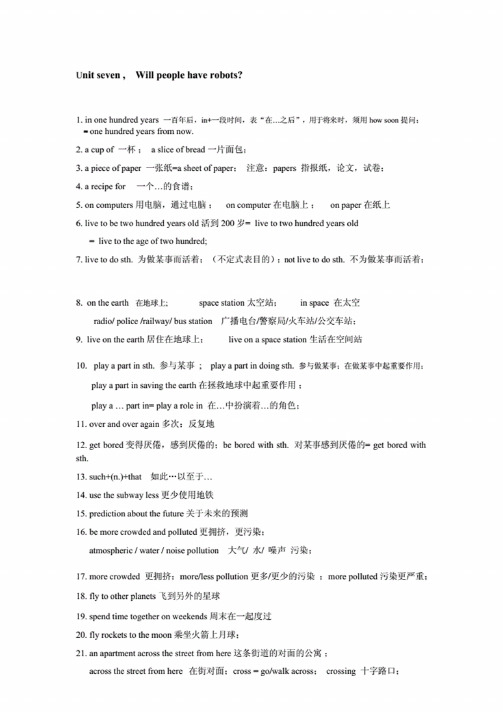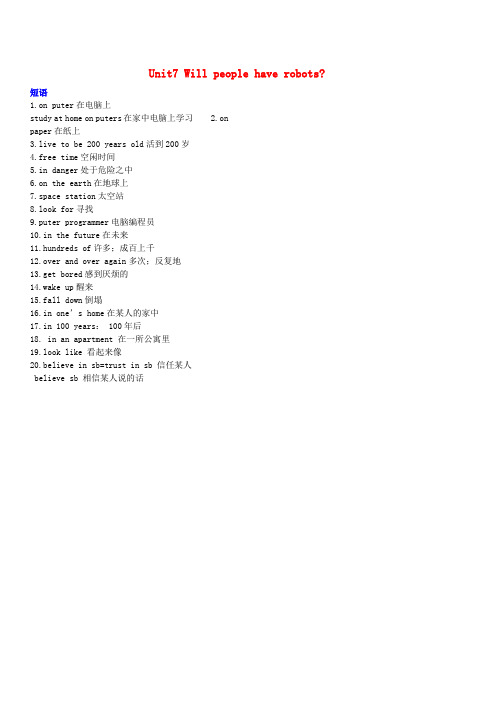【重点推荐】八年级英语上册 Unit 7 Will people have robots教案 (新版)人教新目标版
Unit7Willpeoplehaverobots默写手册课件英语人教版八年级上册

14. inside adv. & prep.在……里面 15. possible adj.可能的;可能存在或发生的 16. impossible adj.不可能的;不可能存在或发生的 17. siden.一方(的意见、态度、立场) 18. probablyadv.大概;很可能 19. duringprep.在……期间 20. holiday n.假日;假期 21. word n.单词;词
四、常用结构 1. play a part in (doing) sth.参与(做)某事 2. There will be…将有…… 3. It's about…它谈(讲)…… 4. move to… 搬到……
五、重点句式 1.Books will only be on n commppuutteerrss, not on paper.书将会只存在于电脑上, 而不是在纸上。 2.Will people lliivvee ttoo bbee 200 years old 人们将活到200岁吗? 3.WWhhaatt''ss your prediction abouuttthe future 你对未来的预言是什么? 4.Will we have to mmoovvee ttoo other planets 我们将必须搬到其他的星球吗?
4. As a reporter, I think I will meet lots of people.作为一名记者,我想我 会遇到许多人。 5.I'll have fewer pets, though, because I'll have less free time.我将养更少 的宠物,因为我将有更少的空闲时间。
Section B
一、重点单词 1. apartment n.公寓套房 2.space n.太空;空间 3. humanadj.人的 n.人 4. dangerous adj.有危险的;不安全的 5. alreadyadv. 已经;早已 6. factory n.工厂
八年级英语上册-Unit-7-Will-people-have-robots-Section-B(3

应对措施和思路
教学重点
教学重点:
1) 能运用所学的知识及提示来阅读相关个人未来生活预测, 并能完成相关任务。
2)能运用所学的知识与句型表达方式来描绘一下自己未来的生活。
3) 复习要单元所学的重点知识点, 并完成相关复习任务。
(含教法学法、媒体应用等)
教学难点
教学难点:
能运用所学的知识与句型表达方式来描绘一下自己未来的生活。
(9)许多;大量__________
3.Talkin.abou.th.robots:
(1) What can a robot do now?
(2)What will the robots do in the future?
Ⅱ. Lea.i.
1.As.som.S.wha.thei.lif.wil.b.i.th.future.
Will people have robots
一、教材分析
复习用will表达一般将来时态的用法。结合机器人这一话题表达自己的想法。
3) 能够综合运用所掌握的知识来描述自己未来生活的情况
二、学情分析
1.八年级处于思维活跃期, 对学习本单元有好处, 可以进一步开阔学生视野。
3.本单元总体知识结构比较单一, 内容相对比较简单。
(1)在工厂__________(2)帮助做某事________
(3)感到乏味_________________
(4)在将来______________
(5)试着做某事___________________
(6)能够________________
(7)倒塌_______________
(8)似乎能/不可能_____________
人教版英语八年级上册7单元重点短语

Unit seven,Will people have robots?Lin one hundred years一百年后・in+—段时间,表“在…Z后”.用于将来时,须用how soon提问:■one hundred years Irom now.2.a c叩of—杯:a slice of bread一片面包:3.a piece of p aper一张纸=3sheet of paper:注意:papers指报纸,论文,试卷:4.a recipe lor一个...的食谱:5.on computers用电脑,通过电脑:on computer在电脑上:on paper在纸上6.live to be two hundred years old活到200岁=live to two hundred years old=live to the age of two hundred;7.live to do sth.为做某事而活着:(不定式表目的):not live to do sth.不为做某事而活着:8.on the earth在地球上;space station太空站:in space在太空radio/police/railway/bus station广播电台/警察局/火车站/公交车站:9.live on the earth居住在地球上:live on a space station生活在空间站10.play a part in sth.参与某事;play a part in doing sth.参与做某事:在做某事中起重要作用:play a part in saving the earth在拯救地球中起重要作用:playa...part in=play a role in在...中扮演着…的角色:11.over and over again多次:反复地12.get bored变得厌倦,感到厌倦的:be bored with sth.对某事感到厌倦的=get bored with sth.13.such+(n.)+that如此…以至于…e the subway less更少使用地铁15.prediction about the future关于未来的预测16.be more crowded and polluted更拥挤,更污染:atmospheric/water/noise pollution大气/水/噪声污染:17.more crowded更拥挤:morc/less pollution更多/更少的污染:more polluted污染更严重:18.fly to other planets飞到另外的星球19.spend time together on weekends周末在一起度过20.fly rockets to the moon乘坐火箭上月球:21.an apartment across the street from here这条街道的对面的公寓:across the street from here在街对面:cross=go/walk across:crossing十字路口:22.watch movies about the future看关于未来的电影23.make robots look more like humans使机器人看起来更像人类24.do jobs like working in dirty or dangerous places做那些在又脏又危险的地方的工作25.at some point在某一时刻26.do the same things as we can做我们能做的事情27.look less smart看起来没有那么时壁28.clean air清新的空气:fresh water纯净水29.in home某人在家拥有某物:be at home某人在家30.more/fewer people更多/更少的人31.morc/less free time更多/更少的休闲时间32.move to other planets搬到其他星球上e less water节约用水34.plant more trees多种树35.save the earth拯救地球36.world peace世界和平:in peace平静地:peaceful(adj.)平静的:宁静的:和平的;37.in the sea在海里38.build more buildings多盖楼39.near here=in the neighborhood在附近40.in the country=in the countryside在.乡村41.in the factory=at the factory在工厂42.build cars制造车43.do simple jobs做简单的工作44.such jobs这样的工作45.disagree with sb.不同意某人46.hundreds of许多,大量:成百上千47.snake robots蛇形机器人48.twenty years ago 20年前43.seem impossible看来不可能,似乎不可能:43.more like更像51a newspaper rq)ortcr报社记者:as a reporter作为记者52.during the week在工作日53.wear smart clothes穿时髦的衣服54.one day总有一夭55.in life在生活中56..take a holiday度假57.as... as possible尽可能...=as...as one can:反义词impossible(adj.)不可能的:as soon as possible尽可能快(时间):as fast as possible尽可能快(速度):as quickly as possible尽可能快(动作):as early as possible尽可能早(时间):58.the meanings of words单词的意思59.clean the kitchen打扫厨房60.rty up into the sky飞上夭空:高空飞翔:61.in the world在世界上62.pretty far from...;离…相当远63.disagree with sb.不同意某人的意见:agree with sb.同意某人的意见:disagree to do sth.不同意做某事:agree to do sth.同意做某事:64.be free空闲的,免费的:作空闲讲=^)。
八年级英语上册Unit7Willpeoplehaverobots知识点归纳(新版)

Unit7 Will people have robots?短语1.on puter在电脑上study at home on puters在家中电脑上学习 2.onpaper在纸上3.live to be 200 years old活到200岁4.free time空闲时间5.in danger处于危险之中6.on the earth在地球上7.space station太空站8.look for寻找9.puter programmer电脑编程员10.in the future在未来11.hundreds of许多;成百上千12.over and over again多次;反复地13.get bored感到厌烦的14.wake up醒来15.fall down倒塌16.in one’s home在某人的家中17.in 100 years: 100年后18. in an apartment 在一所公寓里19.look like 看起来像20.believe in sb=trust in sb 信任某人believe sb 相信某人说的话用法:1.will+动词原形将要做……2.fewer/more+可数名词复数更少/更多……less/more+不可数名词更少/更多……3.have to do sth.不得不做某事(客观) must 必须(主观)5.There will be + 主语+其他将会有……6.There is/are +sb./sth.+doing sth.有……正在做某事7.make sb. do sth. 8.help sb. with sth.帮助某人做某事9.What will the future be like ? 未来将会是什么样子?10.Which side do you agree with ?你同意哪一方的观点?。
八年级英语上册Unit7Willpeoplehaverobots全部重要知识点(带答案)

八年级英语上册Unit7Willpeoplehaverobots全部重要知识点单选题1、There ______ an English show this weekend. Shall we go and watch it?A.are going to beB.wasC.will beD.were答案:C句意:这个周末将有一场英语表演。
我们去看好吗?考查there be句型的一般将来时。
根据“There”及“this weekend”可知,此句要用there be句型的一般将来时there is/are going to be或there will be的结构,排除B和D选项。
an English show是单数,be要用is,排除A,故选C。
2、We have decided to sell five things ________ we no longer use.A.thatB.whereC.who答案:A句意“我们已经决定卖5个我们不再用的东西”。
本题考查定语从句。
A.关系代词,指人,在从句中作主语、宾语或表语;B.关系副词,表示地点,在从句中作状语;C.关系代词,指人,在从句中作主语和宾语。
本句话中,先行词为five things,指物,且在从句中作宾语,用that,故选A。
3、—Is Helen here?—No, she isn’t here, She ________ in half an hour.A.arrivesB.arrivedC.will arriveD.has arrived答案:C句意:——Helen在这里吗?——不,她不在,她半个小时后就到了。
考查动词时态。
根据“in half an hour”可知,时间为半个小时后,应用一般将来时;其构成为:will+动词原形。
故选C。
4、---It’s reported that Chinese ___________more than 40 minutes a day reading WeChat(微信).---It’s true. But I think WeChat is taking too much of our time.A.spendB.costC.payD.take答案:A试题分析:句意:——据报道中国人一天花费四十多分钟读微信。
2024年人教版八年级上册英语主题阅读Unit 7 Will people have robots?

Unit 7Will people have robots?Passage1(传统文化)中华传统文化, 博大精深!一起来感受吧!2023 is the Year of the Rabbit in China. Many people think this is a really good year. Why? Maybe it’s connected with the animal rabbit. What do people in different 1think about the animal? Let’s have a look.In Chinese people’s eyes, rabbits are quiet, gentle and smart. They are also very quick. A Chinese expression dongru tuotu is used to 2people who are smart and quick like a rabbit. * In a fairy story, there is a Jade Rabbit living on the 3. It’s the pet of Chang’e who is a goddess (女神)4known in China. This may explain 5rabbits are considered as a symbol of good luck.Also, in ancient China, the more children you had, the luckier and 6you would be. It made the rabbit a lucky sign as well because rabbits are full of 7and fertile (繁殖力强的) in nature.Similarly in the West, rabbits are well-known because they can 8in difficult and surprising conditions, with populations growing fast in a short time. Rabbits are also considered to be very 9in the West. They also think the rabbit’s foot is able to bring good luck.Another 10for good luck found in North America and the UK is to say the word “rabbit”on the first morning of every month.So, maybe the Year of the Rabbit can bring you some good luck, too.1. A. periods B. culturesC. brainsD. situations2. A. require B. check C. praise D. believe3. A. farm B. earth C. desert D. moon4. A. softly B. wisely C. widely D. silently5. A. why B. which C. when D. what6. A. happier B. smarterC. youngerD. noisier7. A. custom B. energy C. danger D. heat8. A. jump B. live C. climb D. dream9. A. moving B. curious C. lucky D. strange10. A. cause B. power C. voice D. traditionPassage2(文化习俗)骑着耕牛, 踏着立春的步伐, 唱着小燕子的歌谣, 来了解立春的文化习俗吧!Beginning of Spring comes. Everything turns green and becomes full of vigor. People can clearly notice that daytime becomes longer and the weather gets warmer. The traditional Chinese lunar calendar divides the year into 24 solar term. Beginning of Spring (立春) is the first solar term of the year. Here are some spring customs (习俗).Flying a kite. Spring is the best season for kite-flying.Erecting the egg (立鸡蛋). In China, it is said that the egg can be set upright on the first day of Beginning of Spring.Wearing fabric swallows (佩燕子). Wearing fabric swallows is a custom in some regions in Shanxi. The swallow is a harbinger of spring and a symbol of prosperity and happiness.Biting the spring. In many parts of China, people observe the custom of “biting the spring” on the first day of Beginning of Spring. They eat spring pancakes, spring rolls, or a few carrots.Making a Spring Ox. This custom in Shanxi is practiced right before Beginning of Spring. When spring comes, many people love spring and they do kinds of activities.Here is the survey about 200 people from different places who love customs.根据短文与图表内容, 选择最佳答案。
人教新目标八年级英语上册Unit 7 Will people have robots知识点汇总

知识点回顾语法:一般将来时一般将来时: 表示在将来某个时间要发生的动作或状态, 三种基本结构:⑴will +V. ⑵be going to +V. ⑶be + V.ing一般将来时的时间状语:in + 时间,in the future,next + 时间1.Will +动词原型eg. (1) Kids will study at home. (2) Everything will be free. (3) It will be sunny tomorrow.否定结构: won’t(will not)+动词原型They won’t visit Shanghai.疑问句结构: Will kids study at home2.由“be going to + 动词原形”构成,表示将要发生的事或打算、计划、决定要做到事情。
Eg: Look at the black clouds!It is going to rain . 看那些乌云要下雨了。
We are going to take a walk after supper. 饭后我们要去散步3.be+v.ing某些动词的进行时态表示将要发生的动作。
go, come, leave, meet, start, begin, finish, fly, arrive…..eg. My father is leaving for Shanghai tomorrow. 我爸爸明天要去上海The shops are crowded.Because the Spring Festival is coming. 商店很拥挤因为春节就要到了“There be”句型的一般将来时肯定句:There will be +名词+其他成份[注意]:无论后面加单数名词或复数形式,be都必须用原形。
要点讲解Will there重点短语it will be difficult to do sth.不同意某人重点搭配重点短语Section A:1.play a part in saving the earth2.in 100 years3.on computers4.live to be….years old5.less free time6.world peace7.be free8.in great danger9.in the future10.move to other planetsSection B:1.fly rockets to the moon乘火箭到月球→fly up into the sky2.on a space station3.be able to…4.look for5.look like6.take a holiday7.the meaning of…..8.wake up….9.one day10.hundreds of11.over and over again12.do the same things as humans13.fall down14.seem impossible15. as a reporter语法聚焦----Will people use money----No, they won’t. Everything will be随堂练There ______a splendid football event(.I hope we'll study ______ home ______computers in the future.in;We should play a part in ______the party.organizingWe will have ______ free time next year than this year.Michael or Tony?______ ______ be a soccer match this weekend?.我们今天下午要为英语考试作准备。
部编版八年级英语上册Unit7Willpeoplehaverobots带答案知识点总结归纳

(名师选题)部编版八年级英语上册Unit7Willpeoplehaverobots带答案知识点总结归纳单选题1、They usually go shopping ______ their lunch time.A.againstB.amongC.betweenD.during2、It usually takes us quite a long time to ________ master a skill. A.trulyB.simplyC.hardlyD.probably3、Thanks for letting us borrow your camera. We__________it to you next Monday.A.returnB.will returnC.have returned4、—There ________ a Chinese Characters Dictation (汉字听写大赛) in our school next Friday. Did you tell Olive about it?—Oh, I ________. I will call her at once.A.will be; forgotB.is going to have; forgotC.are going to be; forgetD.will be; forget5、— Do you often go swimming_____ Sunday mornings?— Yes. Why not _____with me this Sunday?A.on, goB.in; to goC.on; goingD.in going6、Mr Brown ________ to China last year and ________ in love with this country.A.comes; fallsB.came; fellC.came; fallsD.comes; fell7、Jack is good at math, so he can’t ________ that he didn’t pass the math exam. A.promiseB.describeC.believeD.relax8、Mother’s Day is_____the second Sunday in May in the United States.A.onB.inC.at语法填空9、The old buildings are too _________ (danger) for them to live in.10、We’re told that a charity show ________ (take) place next Sunday.11、Swimming alone in the river is _______ (danger) for children.12、We ________ (have) a picnic if it is fine tomorrow.13、It is ________ (possible) for us to finish the work in such a short time.完成句子14、我认为在2060年你想要的东西都会免费。
- 1、下载文档前请自行甄别文档内容的完整性,平台不提供额外的编辑、内容补充、找答案等附加服务。
- 2、"仅部分预览"的文档,不可在线预览部分如存在完整性等问题,可反馈申请退款(可完整预览的文档不适用该条件!)。
- 3、如文档侵犯您的权益,请联系客服反馈,我们会尽快为您处理(人工客服工作时间:9:00-18:30)。
Unit 7 Will people have robots?课时教学设计第一课时Section A (1a-2d)1.通过看图说话、师生问答、听录音、角色扮演等形式,使学生掌握本课时的词汇、短语paper,pollution,prediction,future,pollute,environment,planet,earth,plant,part,play a part。
2.通过师生问答、角色扮演、调查采访、做游戏等形式,使学生学会“Will people use money in 100 years?”“No,they won't.Everything will be free.”等句型,使学生学会对未来进行预测。
重点使学生掌握含有将来时的句型,能表示自己对未来的预测。
难点让学生运用所学句型“Will people…?”对未来进行预测并表述自己的观点。
Step 1 情景导入通过师生问答讨论有关机器人的事情,为导入新课做准备。
For example:T:Did you see robots?S1:Yes,I did.T:Do you have a robot?S1:Yes,I do.My father bought me a robot as my birthday gift.T:Can it dance?S1:Yes,it can.T:Can it sing?S1:Yes,it can.T:Wow,sounds interesting.Will people have robots in their homes?Ss:Yes,they will.…Step 2 完成教材1a-1c的任务1.在今后的100年里世界将会有怎样的不同呢?阅读1a中的预言,同意请在A处打勾,不同意请在D处打勾,完成后小组内互相交流。
2.熟读1a中的句子,并两人一组互相背诵句子。
3.以小组为单位,结合图片和1a中的句子,小组讨论一般将来时态的各种句型的构成,教师点拨。
4.认真听录音并在1a中圈出你所听到的预测,集体核对答案,完成课本中1b的听力任务。
5.再听一遍录音,并跟读对话。
6.仿照1c中的对话,两人一组来对1a中的活动进行对话练习,并邀请一些小组表演对话。
A:Will people use money in 100 years?B:No,they won't.Everything will be free.Will people live to be 200 years old?A:Yes,they will.7.小结训练。
(B)(1)I often listen to music ________ the radio.A.at B.on C.in D.by(B)(2)I hear she will be back ________ three days.A.at B.inC.after D.for(A)(3)People ________ robots in 100 years.A.will have B.haveC.had D.are having(C)(4)—Will the kids go to school with their parents?—________.A.Yes,they are B.No,they willC.Yes,they will D.No,they aren't(C)(5)There ________ a talk show on CCTV-2 at eight this evening.A.will have B.is going to haveC.will be D.is having(B)(6)There ________ some milk on the table.A.am B.is C.are D.beStep 3 完成教材2a-2c的任务1.大声朗读2a中的句子,为听力做好准备。
2.听录音,圈出括号中你所听到的单词,完成2a。
3.朗读2b中的句子,然后再听一遍录音,圈出你所听到的预言,完成2b。
4.听第三遍录音,学生跟读对话。
5.两人一组根据2a、2b中的信息来练习对话,谈论预言。
A:What's your prediction about the future?B:I think there will be more pollution.A:Really?I don't think so.But I think there will be fewer trees.6.结合2a-2c中的句子,小组内讨论 there be,less,more,fewer的用法,教师点拨重难点。
7.小结训练。
(A)(1)I hope I have ________ free time.I don't like to keep busy.A.more B.lessC.many D.much(B)(2)If there are ________ trees,the air in our city will be ________ cleaner.A.less,more B.more,moreC.more,much D.much,more(B)(3)I am happy because I have ________ homework to do today than yesterday.A.more B.lessC.few D.fewer(D)(4)There ________ an English speech contest tomorrow afternoon in our school.A.will have B.will isC.is going to have D.will be(D)(5)In ten years John ________ an astronaut.A.is B.wasC.will is D.will be(C)(6)She is very happy,because she ________ in a big apartment next year.A.live B.livesC.will live D.will livingStep 4 完成教材2d的任务1.播放2d的对话录音,让学生跟读,模仿并理解大意。
2.大声朗读2d对话,读熟后与同伴结对练习,分角色表演对话。
3.邀请三组学生来表演对话。
Step 5 布置作业1.我们的世界充满阳光、鲜花和绿草。
我们的世界充满幸福和快乐。
100年后,我们的世界会怎样?我们还用钱吗?针对这个问题调查你的小组成员,并完成下列表格。
然后Sally thinks cities will be more polluted.And there will be fewer trees.People will not use money.Everything will be free.2.完成《探究在线·高效课堂》本课时练习。
第二课时Section A (Grammar Focus-3c)1.通过看图说话、师生问答、调查报告、听录音、角色扮演等形式,使学生掌握本课时词汇peace,sky,sea的用法,让学生学会表达自己对未来的预测。
2.通过看图说话、师生问答、调查报告、听录音、角色扮演等形式,使学生掌握本课时一般将来时的用法。
重点掌握对未来做出预测所使用的句型,例如“There will be more people.”等;学会more(many/much的比较级),less(little的比较级)和fewer(few的比较级)的用法。
难点掌握对未来做出预测所使用的句型。
Step 1 情景导入通过自由交际进行复习热身。
教师在黑板上板书一系列时间:上课当天的日期、一周后、一月后、一年后、五年后……指着黑板上的时间依次询问学生问题,让学生回答。
然后让学生同伴之间进行问答,通过自由交际,培养学生的学习兴趣,导入新课。
For example:T:I'm a teacher now.I will still be a teacher in a week.You are a student.What will you be in a week?S1:I will still be a student in a week.T:What will you be in a month/a year/five years?…Step 2 完成教材Grammar Focus的任务1.学生阅读Grammar Focus中的句子,然后做填空练习。
(1)将来会是什么样子?What ____the ____be ____?(2)城市污染将会更多。
且树木将会更少。
Cities ____ ____ ____ polluted.And there ____ ____ ____ ____.(3)一百年后,人们会使用钱币吗?____ people ____ money ____100 years?(4)不会的。
一切东西将会免费。
No, they ____.Everything ____ ____ ____.(5)世界将会有和平吗?____ ____ ____world peace?(6)是的,我希望如此。
Yes, I ____ ____.(7)孩子们将会在家中的电脑上学习。
Kids ____ ____ at home ____ ____.(8)他们将不会去上学。
They ____ ____to school.2.学生们根据记忆,看大屏幕来完成填空练习。
3.学生们完成填空试题后,可以打开课本检查答案,对错误的句子,单独进行强化记忆。
4.一般将来时态肯定式:主语+will+动词原形Kids will study at home on computers.孩子们将会在家里的电脑上学习。
否定式:主语+won't+动词原形People won't use money in 100 years.一百年后人们将不再使用钱币。
一般疑问句式:Will+主语+其他?肯定回答:Yes, 主语+will.否定回答: No, 主语+won't.例如:人们将会有更多的空闲时间吗?是的,会。
/ 不,不会。
—Will people have more free time?—Yes, they will./No, they won't.5.There be 句型:(1)there be 句型表示客观存在的“有”(所有者不明确)。
例如:湖边附近有很多树。
